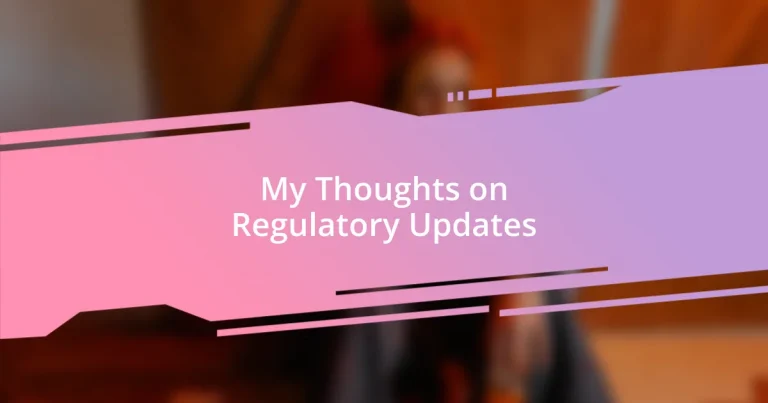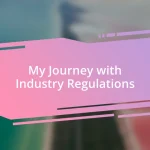Key takeaways:
- Regulatory updates prompt organizations to adapt and can transform challenges into opportunities through proactive strategies and team engagement.
- Staying informed about regulatory changes enhances organizational resilience, fosters a culture of accountability, and helps maintain customer trust.
- Creating a culture of continuous learning and sharing insights within teams can lead to innovative solutions and improved compliance practices.
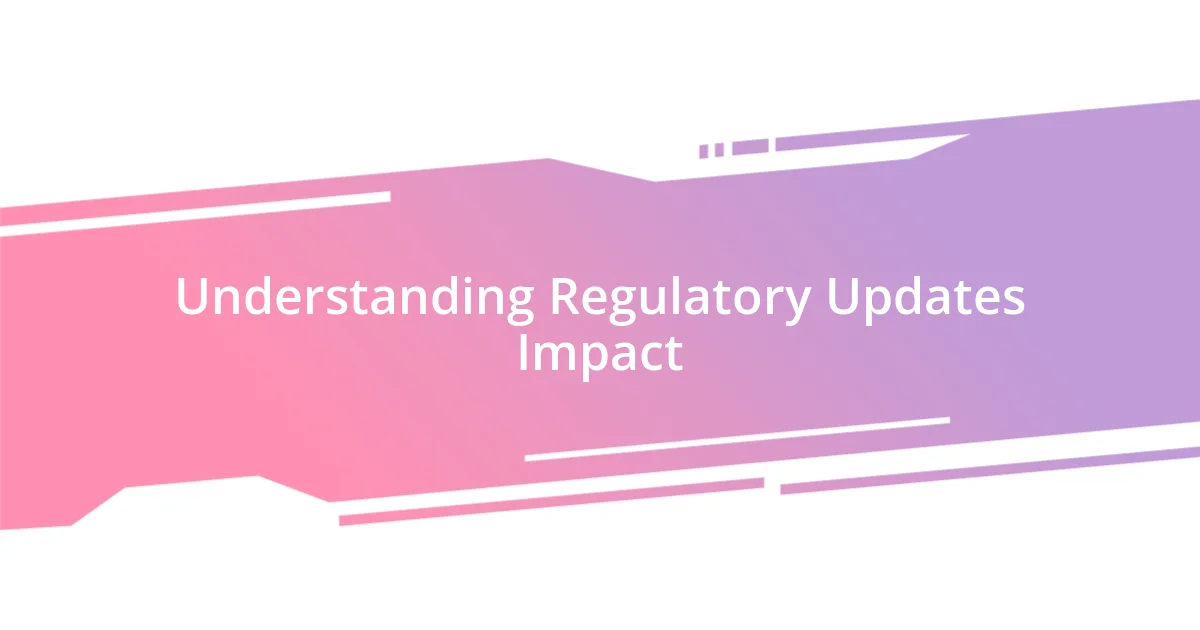
Understanding Regulatory Updates Impact
Regulatory updates can feel like tectonic shifts in an industry, often leaving individuals and organizations scrambling to adapt. I remember when a major financial regulation was announced; the tension in the room was palpable. How would we navigate the new rules? That uncertainty sparked countless discussions, forcing me to reassess not just compliance, but our entire business strategy.
The real impact of these updates isn’t always immediately visible. For instance, after a recent data privacy law was enacted, I witnessed clients’ mounting anxiety over how to secure sensitive information. This law not only affected compliance procedures but also shifted the way businesses approached customer trust. I often ask myself—how can we turn these challenges into opportunities, rather than viewing them purely as obstacles?
Finally, it’s essential to recognize that understanding these updates goes beyond just legal compliance. It’s about shaping a proactive response that aligns with both organizational values and customer expectations. Reflecting on my experiences, I’ve found that engaging team members in discussions about regulatory changes fosters a culture of adaptability. So, how can we ensure that everyone feels empowered to embrace change, rather than fear it?
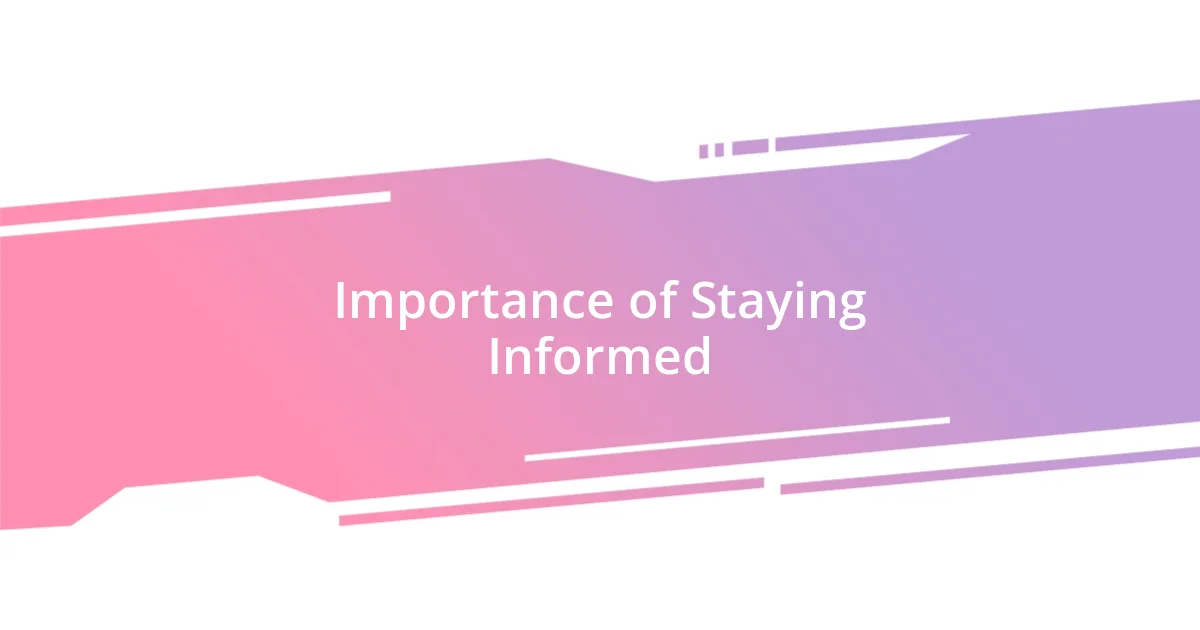
Importance of Staying Informed
Staying informed about regulatory updates is vital for anyone in today’s fast-paced environment. I once had a colleague who disregarded a significant update, thinking it would not impact her daily tasks. However, when the time came for compliance checks, her oversight created chaos, not only for her but for the entire team. This experience taught me that ignorance not only hampers individual performance but can also ripple out to affect broader organizational health.
- Regulatory updates keep you ahead of potential risks, allowing you to mitigate issues before they arise.
- Being informed enhances your ability to adapt your strategies, turning challenges into opportunities.
- Awareness fosters a culture of accountability and encourages open communication among team members.
- Understanding regulations helps maintain customer trust, as clients appreciate businesses that prioritize transparency and compliance.
- Following updates facilitates informed decision-making, empowering you and your organization to thrive in uncertain times.
Incorporating all these elements into our daily routines can transform our approach to change, turning it from daunting into manageable.
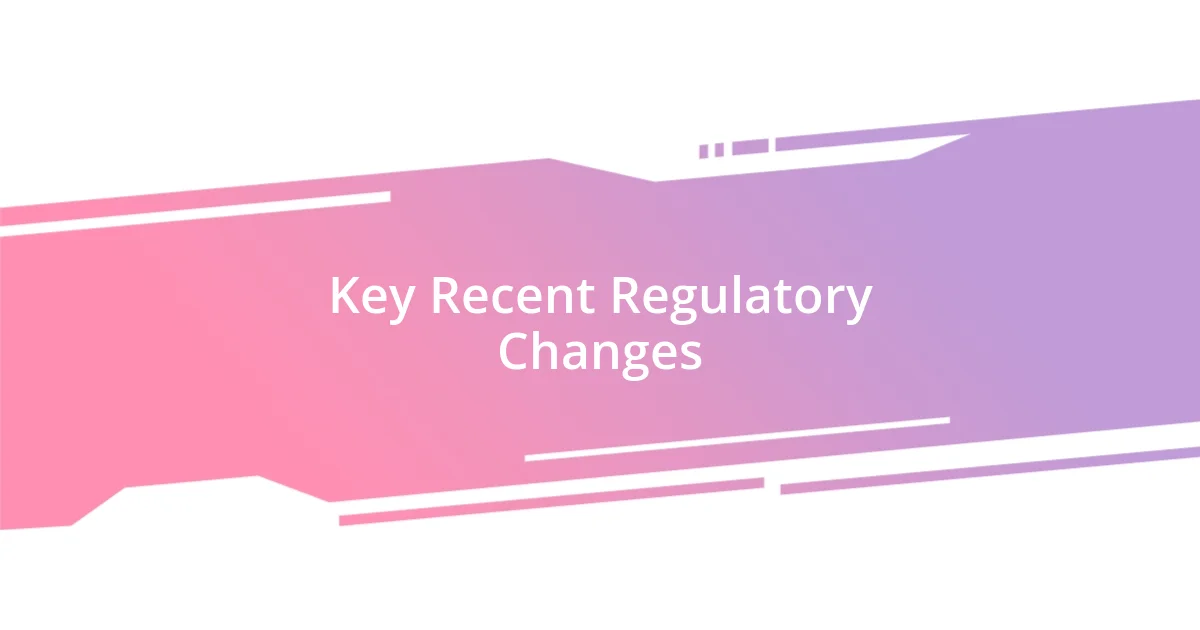
Key Recent Regulatory Changes
Regulatory changes often emerge unexpectedly, challenging our established norms. I recall an instance when a sudden environmental regulation was introduced, requiring immediate adjustments to our processes. The initial shock was overwhelming; however, as I delved into the implications, I found that it encouraged a more sustainable mindset within our team, transforming what felt like an obstacle into a chance for innovation.
One notable change recently was the implementation of stricter anti-money laundering (AML) regulations. This shift required organizations to enhance their compliance frameworks significantly. Observing my colleagues grapple with the new reporting demands, I realized that building a strong foundation in our compliance practices not only met regulatory requirements but also fortified our overall business integrity. It underscored the lesson that often, adapting to regulations can polish our ethical standards.
Moreover, as we reflect on these changes, we must consider their long-term implications. For example, the updates surrounding digital currency regulations have fostered a whirlwind of opportunities. I often think about how this regulatory landscape can influence client engagement, sparking conversations about new business models that prioritize transparency and security. Embracing these updates can lead to a more resilient and forward-thinking organization.
| Regulatory Change | Impact |
|---|---|
| Environmental Regulation | Required process changes and promoted sustainability |
| Anti-Money Laundering Regulation | Enhanced compliance frameworks and boosted business integrity |
| Digital Currency Regulation | Opened opportunities for new business models and client engagement |
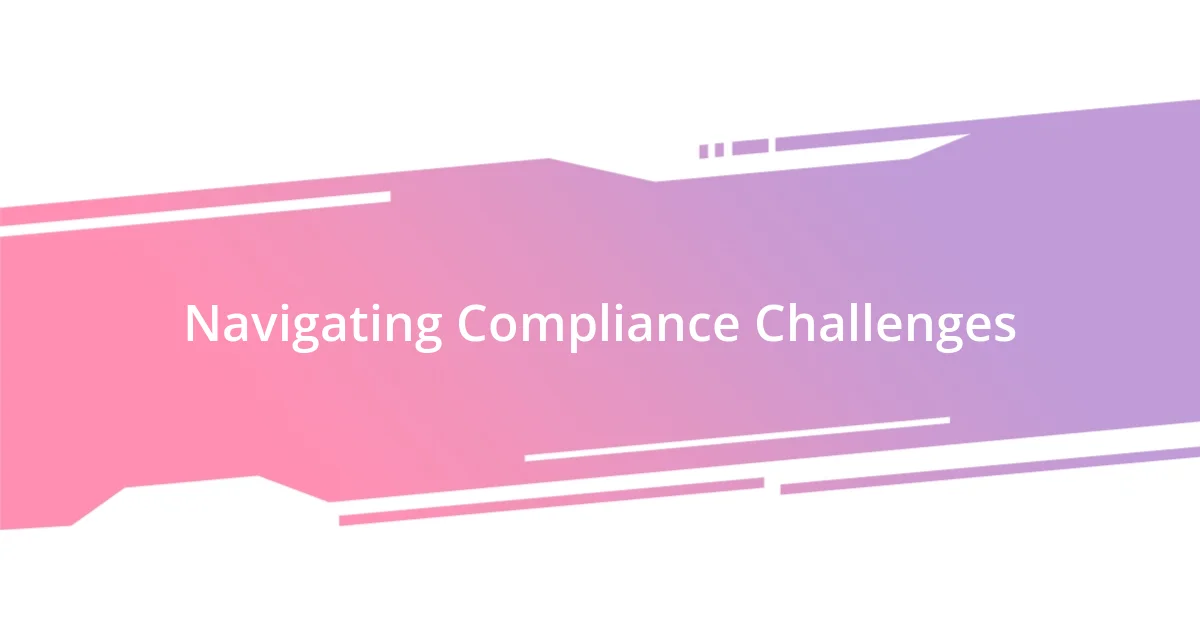
Navigating Compliance Challenges
Navigating compliance challenges can often feel like walking a tightrope. I remember when we faced a sudden overhaul in data protection laws that left our team scrambling. The pressure was intense. But, through collaboration and open dialogue, we managed to transform our anxiety into a robust compliance strategy that not only met the requirements but also built a stronger team spirit. Isn’t it fascinating how adversity can sometimes force us to forge deeper connections?
I’ve also seen how a proactive approach towards compliance can shift the narrative. When our organization anticipated potential changes in health regulations, we initiated training sessions well in advance. This foresight enabled us to tackle the compliance maze with confidence. It got me thinking—what if more teams embraced this forward-thinking mindset? Perhaps we could all learn to view compliance not just as a requirement but as a cornerstone of our operational resilience.
Sometimes, the emotional weight of compliance feels daunting. I recall a late night when I was knee-deep in regulatory documents, and the sheer volume was overwhelming. In those moments of self-doubt, I often pondered how crucial it is to lean on colleagues for support. By sharing our struggles and triumphs, we can lighten the load and foster a culture where compliance challenges become shared victories rather than heavy burdens. Don’t you think that building a supportive environment can make all the difference?
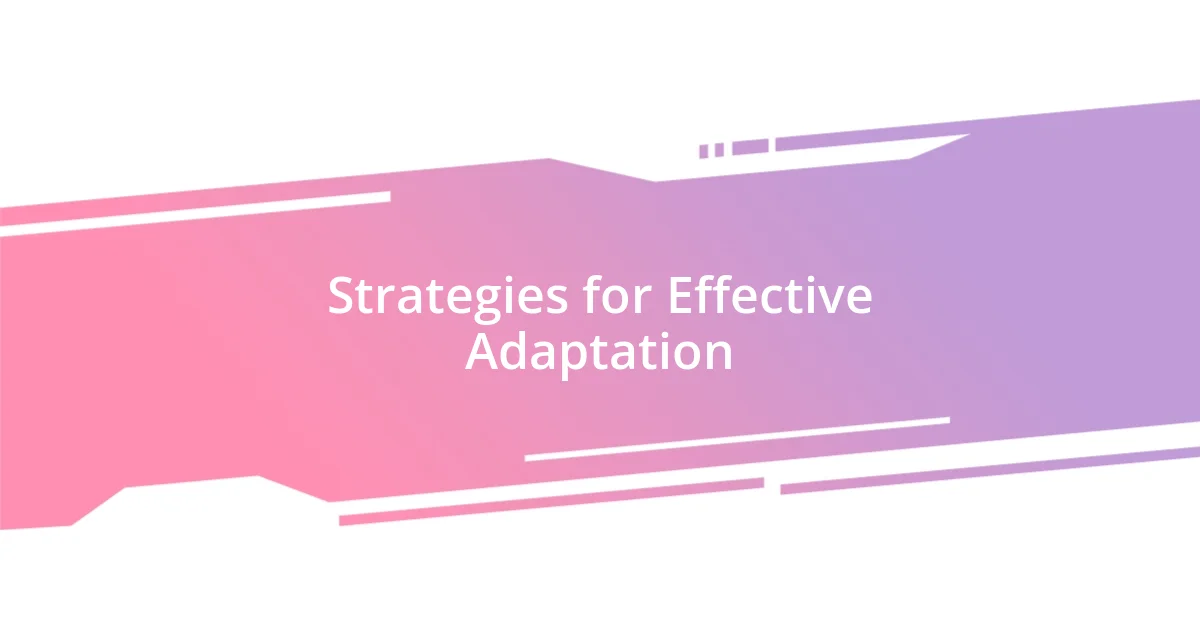
Strategies for Effective Adaptation
As I reflect on the necessity of effective adaptation to regulatory changes, I’ve found that staying ahead requires not just awareness, but also a strategic mindset. For instance, when our industry faced unexpected shifts in compliance requirements, I gathered a cross-functional team to brainstorm solutions. This collaborative effort not only enhanced our response but also sparked a newfound creativity that changed how we approached challenges moving forward.
One of the most powerful strategies I’ve implemented is creating a culture of continuous learning. I remember facilitating a workshop after a major regulatory change, where team members shared their insights and experiences. The energy in that room was palpable, and it dawned on me just how essential it is to encourage knowledge sharing; it transforms once daunting regulations into shared challenges we tackle together. Have you considered how similar initiatives could empower your team?
In my experience, utilizing technology effectively has also played a crucial role in adapting to regulatory updates. By integrating compliance tracking software, my team could streamline our processes and ensure that nothing slipped through the cracks. It was a game-changer! I often wonder—could the efficient use of technology be the key to not just compliance, but to setting a precedent for organizational excellence? This approach has significantly relieved stress during transitions, turning what could have been a chaotic adjustment into a structured transition.
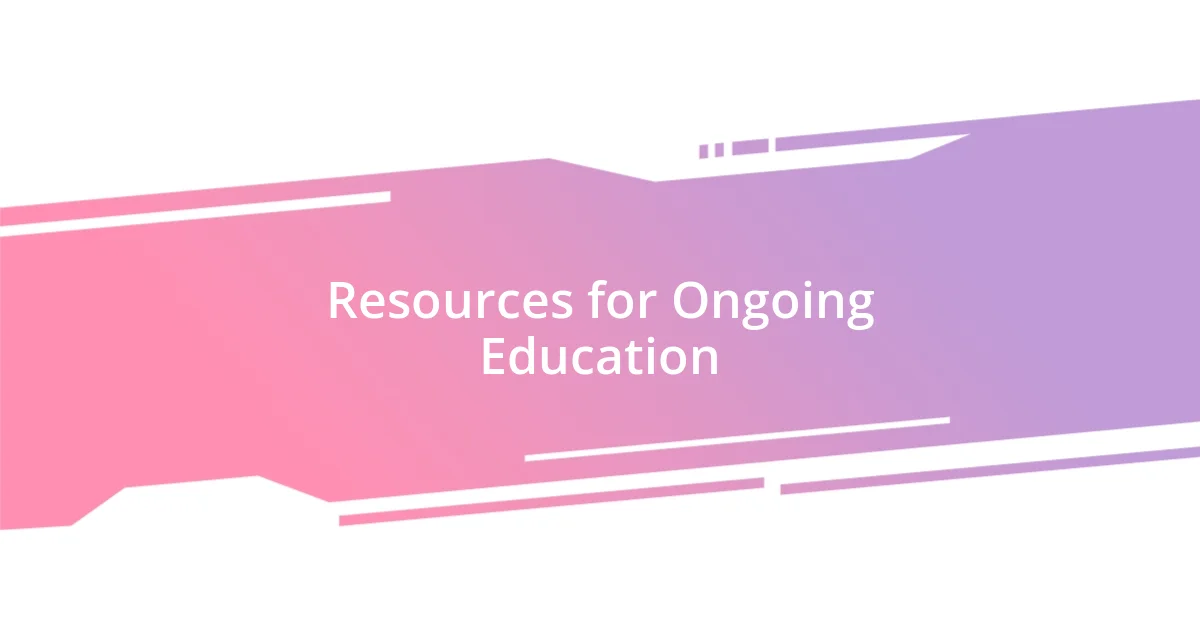
Resources for Ongoing Education
When it comes to ongoing education in the realm of regulatory updates, I’ve found that leveraging online courses can be a game changer. I remember enrolling in a webinar series focusing on recent industry changes. The flexibility of online learning allowed me to absorb complex topics at my own pace, sparking ideas for our compliance strategies. Isn’t it refreshing to realize that a few hours spent with the right resources can enrich our understanding tremendously?
I often recommend joining professional organizations as another valuable resource. I became a member of a compliance-focused group, where regular newsletters and networking events kept me informed on the latest developments. Engaging with peers not only provided insight into best practices, but also offered a supportive community that I could turn to during challenging times. Have you thought about how a network of like-minded professionals could enhance your own educational journey?
Lastly, I wholeheartedly endorse the power of podcasts. A few years back, I stumbled upon a series dedicated to legal updates—those deep dives into emerging regulations became part of my weekly routine. The conversations I heard not only clarified complexities but also sparked conversations in our office. It’s incredible how a simple audio format can turn dull regulatory jargon into engaging insights, don’t you think?
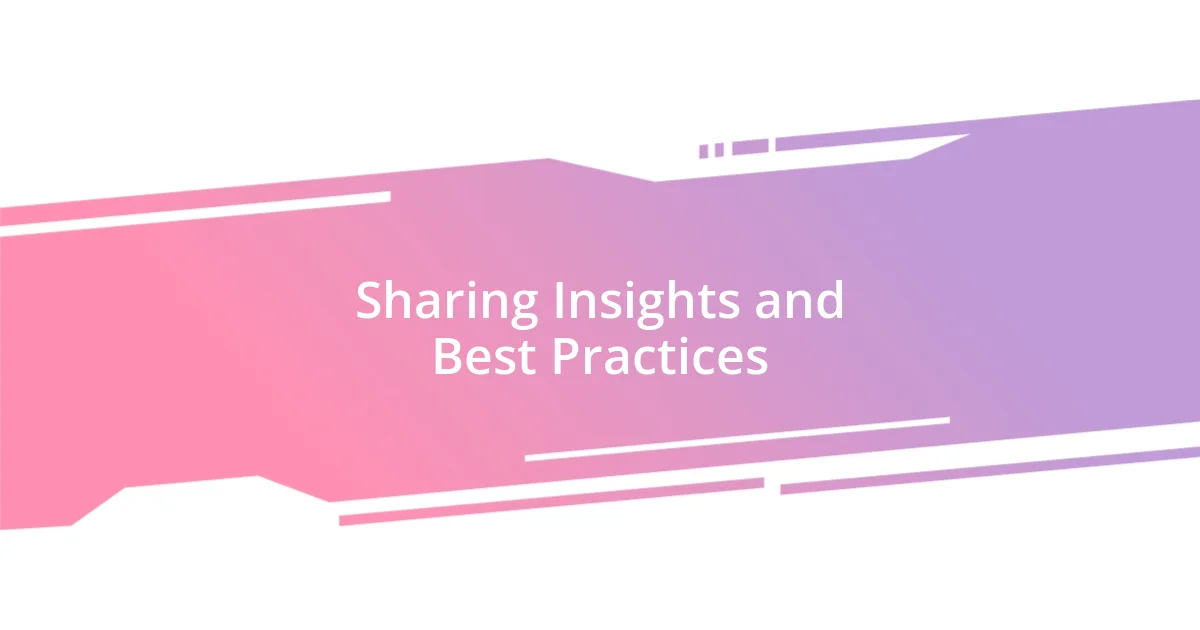
Sharing Insights and Best Practices
One essential practice I’ve adopted is organizing ‘knowledge shares’ within my team. Each month, we collaboratively discuss the latest regulatory updates and how they impact our work. I can’t emphasize enough how uplifting it feels to see diverse perspectives come together; it enriches our understanding and fosters a sense of unity in tackling compliance challenges. Have you ever experienced that ‘aha’ moment when a colleague offers a new viewpoint?
Another insight I’ve gained is the importance of documenting and communicating lessons learned. After navigating a significant regulatory shift, I created a digest outlining our experiences and shared it across the organization. The feedback was overwhelmingly positive, and I realized that reflecting on our journey not only helps us evolve but also inspires others to approach future changes with confidence. How does your team celebrate its learning moments?
Finally, I’ve seen firsthand the value of mentorship in sharing best practices. When I took a new recruit under my wing, I was reminded just how powerful it is to share knowledge in a one-on-one setting. Their fresh perspective challenged my own thinking, leading to creative solutions for compliance hurdles. It’s fascinating to see how teaching others can reshape our own understanding, don’t you think?












